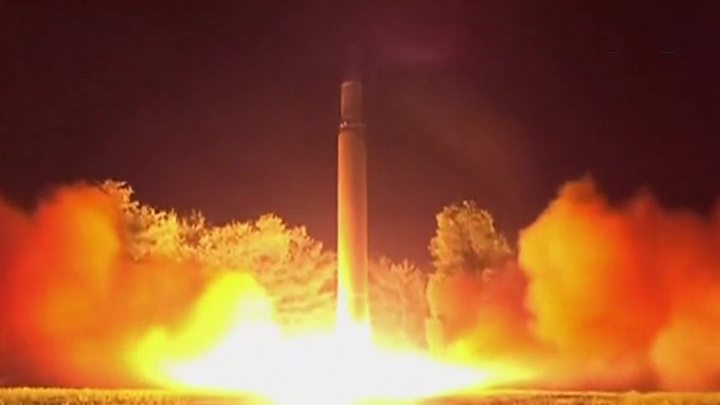
This article is more than
8 year oldA resolution banning North Korean exports and limiting investments in the country was passed unanimously.
The US ambassador to the UN, Nikki Haley, said it was "the most stringent set of sanctions on any country in a generation".
Pyongyang tested two intercontinental ballistic missiles in July, claiming it now had the ability to hit the US.
However, experts doubt the capability of the missiles to hit their targets.
The tests were condemned by South Korea, Japan and the US, and prompted the drafting of the new UN sanctions.
The export of coal, ore and other raw materials to China is one of North Korea's few sources of cash.
Estimates say that North Korea exports about $3bn worth of goods each year - and the sanctions could eliminate $1bn of that trade.
Earlier this year, China suspended imports of coal to increase pressure on Pyongyang.
However, repeated sanctions have so far failed to deter North Korea from continuing with its missile development.

China, North Korea's only international ally and a veto-wielding member of the UN Security Council, voted in favour of the resolution this time. It has often protected Pyongyang from harmful resolutions in the past.
The US ambassador said the Security Council had increased the penalty for North Korea's ballistic missile activity "to a whole new level".
"Today the Security Council has come together to put the North Korean dictator on notice," Ms Haley told the council after the vote.
"North Korea's irresponsible and careless acts have just proved to be costly for the regime."
She also praised China's stance.
China's ambassador, Liu Jieyi, said the resolution showed that the world was "united in its position regarding the nuclear position on the Korean peninsula".
He welcomed US statements that it was not seeking regime change or prioritising the reunification of Korea.
But - along with the Russian ambassador - he criticised the US deployment of the Thaad anti-missile system in South Korea, calling for the deployment to be halted.
UK ambassador Matthew Rycroft said: "North Korea bears full responsibility for the measures we have enacted today.
"It does not have to be this way. North Korea should forgo the path of provocation, forgo the path of further escalation."
The isolated state's repeated missile and nuclear weapon tests have been condemned by neighbours in the region.
But South Korea says it may hold direct talks with the North during a regional meeting this weekend.
Foreign Minister Kang Kyung-wha said she was willing to talk to her counterpart from Pyongyang, if the chance "naturally occurs".
Foreign ministers from the Association of Southeast Asian Nations (Asean) are meeting in Manila in the Philippines.
South Korea's Yonhap news agency reports "cautious expectations" that Kang Kyung-wha would meet North Korea's Ri Yong-ho on the sidelines of the forum.
"If there is an opportunity that naturally occurs, we should talk," Ms Kang told the agency.
"I would like to deliver our desire for the North to stop its provocations and positively respond to our recent special offers [for talks] aimed at establishing a peace regime."
US Secretary of State Rex Tillerson will also be attending the weekend's talks, where North Korea's nuclear programme is expected to be a main topic.
As the meeting began, Asean members issued a joint statement saying they had "grave concerns" over North Korea's actions, which "seriously threaten peace".